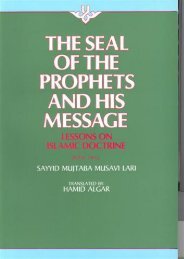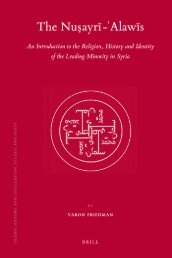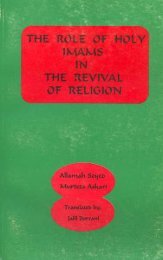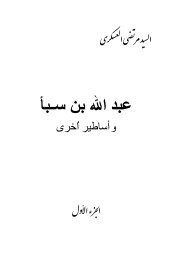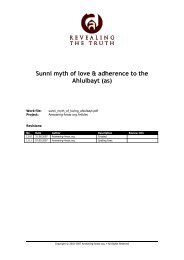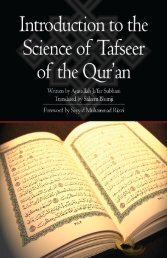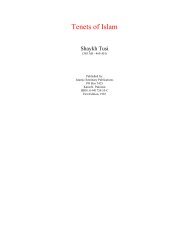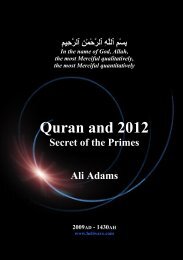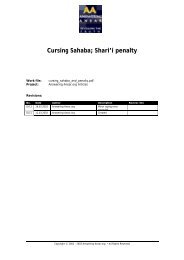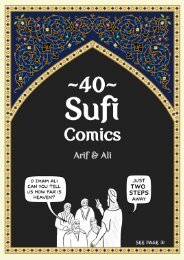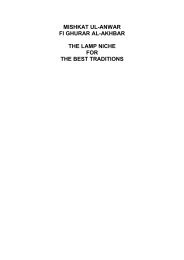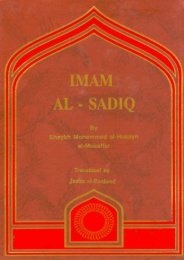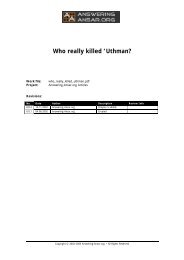- Page 3:
CHAPTER : 1 PROFILES OF THE BENEVOL
- Page 9 and 10:
share of some deserving person and
- Page 11 and 12:
Holy Quran and a hamael ( a miniatu
- Page 13:
STEP 3 THE CONDITIONS FOR PRAYER Go
- Page 16 and 17:
Imam Jafar e Sadiq (a.s.) said, “
- Page 18:
Therefore Hazrat Ibrahim (a.s.) tho
- Page 22 and 23:
used to reply,” don’t you know
- Page 24 and 25:
There are people in this world who,
- Page 26 and 27:
himself with burgling less importan
- Page 28 and 29:
in the transmigration or penetratio
- Page 30 and 31:
DISCUSSION ON THE CONCEPT OF TRANSM
- Page 32 and 33:
Similarly the ears through which he
- Page 34 and 35:
subdued Hussain; Hussain will be eu
- Page 36 and 37:
that would be heresy; as the Christ
- Page 38 and 39:
comes up to their waist. Some other
- Page 40 and 41:
THE NINTH FUNDAMENTAL THE MEANINGS
- Page 42 and 43:
CHAPTER 4 THE BENEFITS THE FIRST BE
- Page 44 and 45:
gave to Hazrat Isa (a.s.) the mirac
- Page 46 and 47:
(1 ) Before the Baasat ( annunciati
- Page 48 and 49:
and said, “ A thing is good if it
- Page 50 and 51:
(23 ) The wife of Abdallah Muslim s
- Page 52 and 53:
me!!” When she came near Abu Bakr
- Page 54 and 55:
His practice was that he would give
- Page 57:
REFULGENCE OR RAYS OF LIGHT THE FIR
- Page 60 and 61:
obliterated from the sky, the sky w
- Page 62 and 63:
legitimate and illegitimate money i
- Page 64 and 65:
Then I asked, “ O! Son of the Pro
- Page 66 and 67:
the loss with forbearance! With the
- Page 68 and 69:
totally agreed to the orders of his
- Page 70 and 71:
of the forest would have perished a
- Page 72 and 73:
• Imam Reza (a.s.) said, “ The
- Page 74 and 75:
• ” Your expectation is of no a
- Page 78 and 79:
• He will possess a document on w
- Page 80 and 81:
not get any portion to eat, contain
- Page 82 and 83:
others In Faith. They have come her
- Page 84 and 85:
Allah Balqi said, “ O son of the
- Page 86 and 87:
Then Hazrat Ali (a.s.) offered his
- Page 88 and 89:
Yunus bin Tabian narrates that once
- Page 90 and 91:
Imam (a.s.) drank the beverage and
- Page 92 and 93:
Imam Jafar e Sadiq (a.s.) said that
- Page 94 and 95: Vicegerents have been engraved on t
- Page 96 and 97: Judgement, whether your name will b
- Page 98 and 99: The man will not repent and abstain
- Page 100 and 101: Who is your Imam (a.s)? If the pero
- Page 102 and 103: lesson for us to take care in our o
- Page 104 and 105: falsehood will become a virtue, peo
- Page 106 and 107: Meaad is one of the most important
- Page 108 and 109: earth, all its inhabitants would di
- Page 110 and 111: “ Haada yaumu yanfahus saadiqeena
- Page 112 and 113: • Imam Mohammed Baqir was asked b
- Page 114 and 115: “ It is a cistern that Allah has
- Page 116 and 117: are patient and forebearing?’ At
- Page 118 and 119: Then the Prophet (a.s.) said, “ B
- Page 120 and 121: children because they are aware tha
- Page 122 and 123: times better than those who did Jeh
- Page 124 and 125: The best learning and action are wi
- Page 126 and 127: “ If the heart is pure, the entir
- Page 128 and 129: sleep. The name of the person was H
- Page 130 and 131: and gives a reference that he had h
- Page 132 and 133: • The man gave him a tumbler full
- Page 134 and 135: PENITENCE & CRYING FOR MERCY For th
- Page 136 and 137: distance after the foul act that a
- Page 138 and 139: who is avaricious in his search and
- Page 140 and 141: Man should not think that a minor s
- Page 142 and 143: of a person is depriving the rights
- Page 146 and 147: stratagem to the man to succeed in
- Page 148 and 149: Allah and they try to prove Haram t
- Page 150 and 151: THE FOURTH RAY OF LIGHT: RECLUSIVEN
- Page 152 and 153: witness for these transaction. The
- Page 154 and 155: clothes. The Prophet (a.s.) didn’
- Page 156 and 157: Imam Jafar e Sadiq (a.s.) has said
- Page 158 and 159: On Ghina or song the opinion of all
- Page 160 and 161: Bayt. The sixth way to remember All
- Page 162 and 163: have termed as Haram. They will hav
- Page 164 and 165: people?” Satan said,” I shall t
- Page 166 and 167: The Prophet (a.s.) added,” the re
- Page 168 and 169: with the comforts he would enjoy in
- Page 170 and 171: THE FRUITS THE FIRST FRUIT: ABOUT F
- Page 172 and 173: and objected to remaining alone in
- Page 174 and 175: said, “ Allah is praising you for
- Page 176 and 177: Therefore Yahya (a.s.)’s mother g
- Page 178 and 179: THE PRAYER OF THE CHIEF OF IMAMS HA
- Page 180 and 181: THE FOURTH FRUIT CENSURING THE WORL
- Page 182 and 183: THE FIFTH FRUIT WHAT THE WORLD MEAN
- Page 184 and 185: the sycophants had made him more co
- Page 186 and 187: without any effort! Your desire is
- Page 188 and 189: interest of the prince in piety. Ba
- Page 190 and 191: Balohar continued, “ It is said t
- Page 192 and 193: knowledge. Of those who see the lig
- Page 194 and 195:
• Yuzasaf asked, “ What are goo
- Page 196 and 197:
matter before pronouncing the final
- Page 198 and 199:
weak and all his faculties too are
- Page 200 and 201:
the dead man gently. With dawn he a
- Page 202 and 203:
looking around the scenic place. Th
- Page 204 and 205:
ask people to follow them. Therefor
- Page 206 and 207:
• Imam Jafar e Sadiq (a.s.) was a
- Page 208 and 209:
goes to the extent of making a pers
- Page 210 and 211:
Allah replied, “ I have observed
- Page 212 and 213:
Hearing these words the guest was o
- Page 214 and 215:
said, “ The right of carrying the
- Page 216 and 217:
then He would have made it difficul
- Page 218 and 219:
SINCERITY OF ACTION The Prophet of
- Page 220 and 221:
THE FIRST QUESTION: How is it possi
- Page 222 and 223:
Omro bin Tabit narrates that Imam M
- Page 224 and 225:
inmates of the passage. In the pit
- Page 226 and 227:
• Imam Jafar e Sadiq (a.s.) narra
- Page 228 and 229:
• Hazrat Ali (a.s.) has said that
- Page 230 and 231:
the Momin. Then the Prophet (a.s.)
- Page 232 and 233:
• Keeping quiet while proceeding
- Page 234 and 235:
• “O Abu Dhar! Truth is more va
- Page 236 and 237:
One category is the height of virtu
- Page 238 and 239:
gives large amounts in charity. He
- Page 240 and 241:
The Prophet of Islam (a.s.) has nar
- Page 242 and 243:
THE ELEVENTH CHAPTER THE STARS THE
- Page 244 and 245:
• One person asked Imam Jafar e S
- Page 246 and 247:
• Imam Jafar e Sadiq (a.s.) has s
- Page 248 and 249:
THE THIRD STAR NON ACCEPTANCE OF PR
- Page 250 and 251:
• In another tradition the Imam (
- Page 252 and 253:
Allah says,” O My creature! Pray
- Page 254 and 255:
• In another tradition it is said
- Page 256 and 257:
prayers while visiting it would pro
- Page 258 and 259:
earth and and the momineen living o
- Page 260 and 261:
a sermon. . Talking of the fear of
- Page 262 and 263:
Some jurists deem it compulsory to
- Page 264 and 265:
• “ A person who recites the Qu
- Page 266 and 267:
FEEDING THE MUSLIM BROTHERS The Pro
- Page 268 and 269:
• Imam Jafar e Sadiq (a.s.) said,
- Page 270 and 271:
this world and the Hereafter. The Q
- Page 272 and 273:
Hazrat Ali (a.s.) has observed, “
- Page 274 and 275:
delicacies. He should visualise tha
- Page 276 and 277:
THE BENEFITS OF RECITING THE QURAN
- Page 278 and 279:
THE BENEFITS OF CERTAIN VERSES OF T
- Page 280 and 281:
THE BENEFITS OF OTHER VERSES OF THE
- Page 282 and 283:
qabuzatu yaumal qiyamati was samawa
- Page 284 and 285:
The Imam (a.s.) also said that a pe
- Page 286 and 287:
Imam Jafar e Sadiq (a.s.) said,”
- Page 288 and 289:
Reciting this verse in the prayers
- Page 290 and 291:
THE THIRD STREAM ABOUT DEALING WITH
- Page 292 and 293:
• Hazrat Ameer al Momineen (a.s.)
- Page 294 and 295:
meantime the infidel king died. All
- Page 296 and 297:
• Imam Jafar e Sadiq (a.s.) says,
- Page 298 and 299:
• In another narration the Prophe
- Page 300 and 301:
Hazrat Ibrahim (a.s.) then told to
- Page 302 and 303:
• It is narrated that those who w
- Page 304 and 305:
control his mind and actions as a p
- Page 306 and 307:
• It has appeared in the traditio
- Page 308 and 309:
emember Allah every moment of their
- Page 310 and 311:
the putrifying carcass is like back
- Page 312 and 313:
• Hazrat Ameer al Momineen (a.s.)
- Page 314 and 315:
exemplary. Books of history are ful
- Page 316 and 317:
the Will of Allah. A person who res
- Page 318 and 319:
him for an explation for these thin
- Page 320 and 321:
2. Forbearance in avoidance of comm
- Page 322 and 323:
• Imam Jafar e Sadiq (a.s.) said,
- Page 324 and 325:
All schools of thoughts in Islam ar
- Page 326 and 327:
Even if this backbiting is in gestu
- Page 328 and 329:
The Prophet of Allah (a.s) has said
- Page 330 and 331:
warning me against litigation the s
- Page 332 and 333:
courtiers that the two mendicants w
- Page 334 and 335:
The cure for the ailment of pride i
- Page 336 and 337:
al Asr (a.s.). He has written a vol
- Page 338 and 339:
who is the chief of the Sufis. The
- Page 340 and 341:
The Prophet of Allah said, “ When
- Page 342 and 343:
• Imam Jafar e Sadiq (a.s.) narra
- Page 344 and 345:
4. SUPERIORITY PF TAHMEED OR PRAISI
- Page 346 and 347:
Because Allah says, thereafter, tha
- Page 348 and 349:
dream again , he heard a loud voice
- Page 350 and 351:
Allaho akbar Allaho akbar kabeeran
- Page 352 and 353:
Astaghfarallah allazi la ilaha illa
- Page 354 and 355:
Imam Mohammed Taqi (a.s.) has said
- Page 356 and 357:
In one narration it is said that th
- Page 358:
syedi shababa ahlal Jannata alaihim



